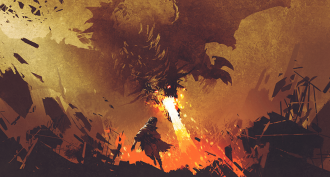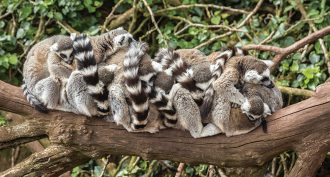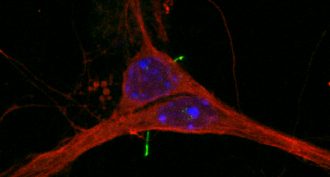Life
-
 Animals
AnimalsNature shows how dragons might breathe fire
Fire-breathing dragons can’t live anywhere outside of a book or TV. But nature provides some guidance as to how they might get their flames. If they existed, anyway.
-
 Life
LifeScientists Say: Kelp
Kelp is a kind of seaweed that forms huge forests under the ocean. But it isn’t a plant; it’s a type of algae.
-
 Animals
AnimalsCan anything stop the big pig invasion?
Millions of wild pigs roam North America, causing billions of dollars in damage every year. Scientists are looking for new ways to stop the swine.
-
 Environment
EnvironmentLight at night lengthens how long birds can spread West Nile virus
Light at night prolongs the time it takes these birds to knock out a West Nile infection. Mosquitoes that bite them during this time can pick up and spread their virus to others — even people.
By Susan Milius -
 Animals
AnimalsThe secrets of super-slurper bat tongues
Tiny hair-like structures greatly boost the ability of some bats to slurp up nectar from flowers.
By Sid Perkins -
 Animals
AnimalsCompared to other primates, humans get little sleep
Short bouts of a sleep, called REM, separate humans from other primates, scientists find. Sleeping on the ground may have a lot to do with it.
By Bruce Bower -
 Psychology
PsychologyBullying alters ‘bugs’ in the gut, hamster data show
A new study found that the microbes in a hamster’s gut changed in response to social stress.
-
 Animals
AnimalsLiving Mysteries: Meet Earth’s simplest animal
Trichoplax is the simplest animal on Earth. It has no mouth, stomach or brain. Yet it can teach how these and other organs evolved.
By Douglas Fox -
 Climate
ClimateAnalyze This: Climate change could make food less healthy
Levels of important nutrients are lower in crops exposed to high levels of carbon dioxide, a greenhouse gas. How high? Try levels expected to be typical 30 years from now.
-
 Health & Medicine
Health & MedicineE-cigarettes don’t need nicotine to be toxic
E-cigarettes without nicotine can still be toxic. New studies find the flavorings in e-cigarettes can harm cells of the human immune system.
-
 Brain
BrainTeeny tiny hairs on brain cells could have big jobs
Brain cells have tiny antennae called cilia. But no one really seemed to know what they did. Now, scientists have shown they could play a role in obesity.
-
 Brain
BrainExplainer: What are opioids?
Opioid drugs can kill pain, but they can also kill people. Here’s how.